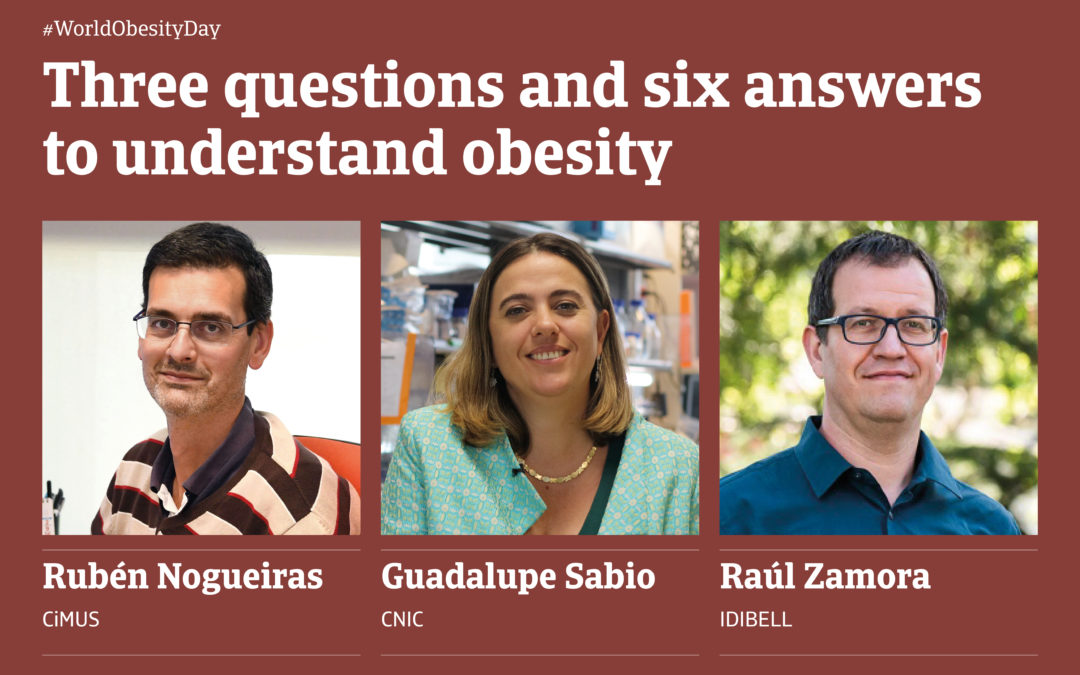World Obesity Day is taking place this week to mark a disease that affects increasingly more people in our country and the world. Despite being a global pandemic and a precursor for many other diseases, there is still much we don’t know about what causes it and how it affects our body.
To help us understand obesity better, we spoke with three researchers who, from different perspectives, are investigating how to treat and prevent this disease. All three have been recognised for their work in this field through the Fundación Occident Research Awards.
They are Guadalupe Sabio, from the Centro Nacional de Investigaciones Cardiovasculares (National Centre for Cardiovascular Research, CNIC); Rubén Nogueiras, from the Centre for Research in Molecular Medicine and Chronic Diseases (CIMUS) of the University of Santiago de Compostela; and Raúl Zamora from IDIBELL.
Is there a gene for obesity?
Guadalupe Sabio
In fact, we know of several genes for obesity. The first one found was the gene for lectin, a protein that tells the brain when we are full. People with a mutation in this gene don’t produce lectin and are always hungry. Through lectin, we realised that obesity can have a significant genetic component, and that adipose tissue is key to hormonal regulation. Ever since, obesity has been studied as a multifactor disease.
Rubén Nogueiras
Our genetics are designed to withstand famine. However, in many parts of the world, there is an excess of food, and these genes designed to make the most of calories must now deal with a hypercaloric diet, plus we also move less. We also know that there are environmental pollutants that promote the development of obesity.
Is obesity already a pandemic?
Raúl Zamora
Obesity is already a global epidemic, and the factors responsible for it are present in every aspect of society: in the absence of healthy habits in family settings, in the agri-food industries and their influential advertising campaigns, in a healthcare system that should explain better the problems associated with obesity and increase the amount spent treating it, and, of course, in the political system, which should promote healthy eating and increased exercise from a young age.
Guadalupe Sabio
It is an epidemic that affects many organs and causes multiple disorders. It increases the size of adipose tissue to prevent excess fat from accumulating in other tissues. This causes chronic inflammation in the body, which raises the risk of other pathologies. In addition, adipose tissue also has a hormonal function, and altering it causes metabolic changes and increases the predisposition to develop diabetes or other cardiovascular or neurodegenerative diseases. For example, in our laboratory we have discovered that changes to fat tissue can cause the liver to become insulin resistant, and thus increase the likelihood of diabetes.
So can obesity be treated only through diet?
Rubén Nogueiras
It makes no sense to treat obesity only through diet, because it is a complex, multi-organ disease. Several organs contribute to weight control: the intestine, liver, adipose tissue, pancreas, etc. They all send information to the brain to report on the “nutritional status” of the body. Our brain analyses this information and sends orders to the other organs to tell them how they should function. This communication between organs is essential for proper weight control, and is the one we are investigating to find other ways to treat obesity.
Raúl Zamora
There are also no miracle diets or foods to combat obesity. The recommendation is always to check with a medical professional, because a healthy and balanced diet combined with more physical exercise tailored to each person is the best solution. But it is true that certain foods should not be missing from a healthy, hypocaloric diet, such as plant foods rich in fibre and low in calories, which are more filling and that, in some cases, can accelerate metabolism and increase calorie burning.
Sabio, Nogueiras and Zamora are continuing to make progress in understanding the causes and complications of obesity, which will allow us to address it more effectively in the future and improve the quality of life of millions of people around the world.

